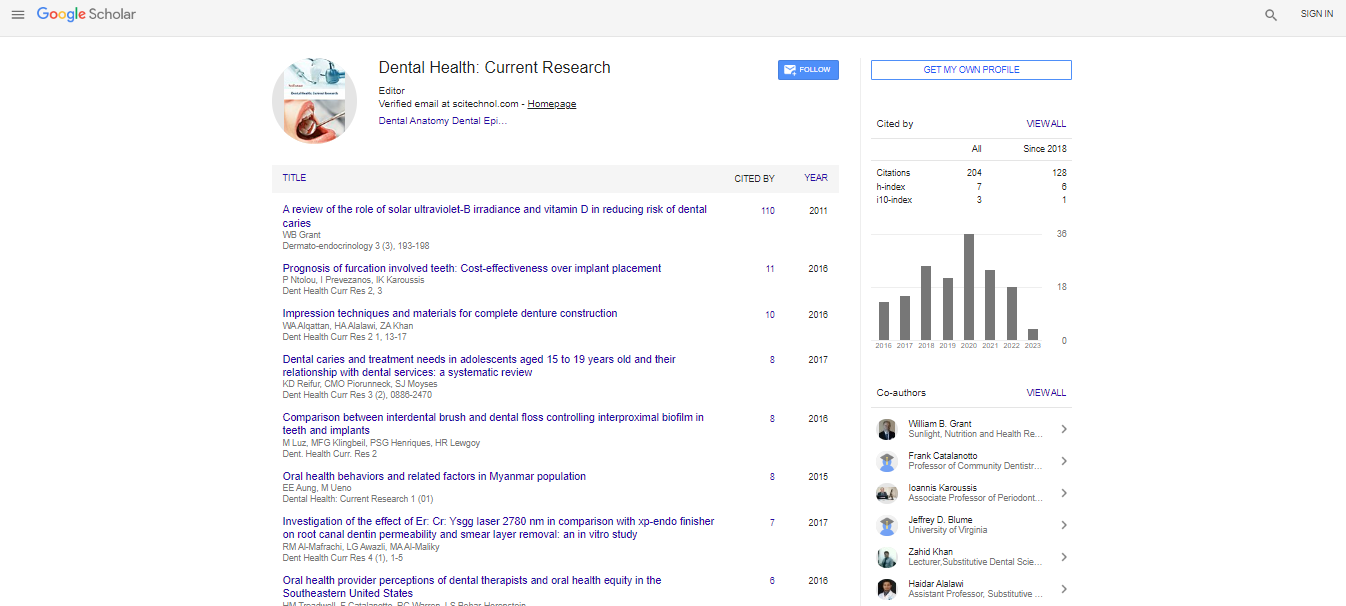Assessment of oral health status and needs of post menopausal women in the north west region of Cameroon
Ambe Joseph Amabo
St . Louis University Institute of Health and Biomedical Sciences, Cameroon
: Dent Health Curr Res
Abstract
The state of being free from mouth and facial pain, oral and throat cancer, oral infection and sores, periodontal diseases, tooth decay, tooth loss, and other diseases and disorders that limits an individual’s capacity in biting, chewing, smiling, speaking, and psychosocial wellbeing is collectively described as “Oral Health” (WHO, 2012). Health itself, as defined by WHO (1946) is “a state of complete physical, mental and social well-being and not merely the absence of disease or infirmity”. Menopause therefore, which is the cessation of a woman's reproductive ability, could be a predisposing factor for changes in the oral cavity. Menopause being the opposite of menarche is usually a natural change; it typically occurs in women’s midlife, signaling the end of the fertile phase of a woman's life. A more accurate definition of menopause is the state of an absence of menstrual periods for 12 months in which menopausal transition starts with varying menstrual cycle length and ends with the final menstrual period (Col et al., 2009). There exist three types of menopause as stated by Gallicchio et al., (2006). Namely; Premature Menopause, Artificial Menopause, Natural Menopause. Natural Menopause is the type of menopause that will occur naturally and gradually over time in a woman that has both or at least one of her ovaries. Naturally occurring menopause shows up most typically between the ages of 45 and 55. While every woman is different, the typical duration of naturally occurring menopause is approximately 5-10 years. In some cases, the entire menopausal process can take nearly 13 years. As your body changes and your hormones are thrown out of balance, your periods may decrease or they may increase. Changes in menses can include: Changes in duration, Changes in intensity, Changes in flow. Premature menopause will happen more quickly and rapidly in women that have both or at least one ovary. Prematurely occurring menopause shows up typically in women in their early 30's to early 40's. While every woman is different, the typical duration for a woman experiencing prematurely occurring menopause is approximately 1-3 years - much shorter than naturally occurring menopause. Some risk factors involved in premature menopause are: Chronic stress, Nutritional deficiencies, and Hormonal imbalances. Artificial menopause happens abruptly and can be very disruptive for women in many different ways. Artificial menopause is most commonly associated with hysterectomy or disruption of the blood supply that carries oxygen to the ovaries. Other factors that can interfere with blood supply to the ovarian tissue can include the following: Chemotherapy, Radiation therapy, Pharmaceutical drug therapies. According to Brunilda N. (2006), naturally occurring menopause therefore occurs in 3 stages. Namely; Perimenopause, Menopause, Post Menopause which can be explained as follows: Perimenopause: In the stage of perimenopause, menstrual cycles are irregular but have not stopped. On average, women are about 47 when they reach Perimenopause. About half of all women in the earlier stages to most women in the later stages of Perimenopause have symptoms like hot flashes. Women can still get pregnant in Perimenopause. Menopause: This is when women have had their final menstrual period. Women will not be able to pinpoint their final period until they've been completely free from periods for 1 year. Hot flashes, vaginal dryness, sleep problems, and other symptoms are common in this stage. Post menopause: This stage happens after women have had no periods for at least 1 year. Once a woman is past menopause, she will be referred to as post menopausal for the rest of her life. Note: After more than 1 year of no menstrual periods due to menopause, any vaginal bleeding is considered abnormal. Oral health status in post menopausal women differs abruptly to that of menstruating women hence, menopause therefore refers to a physiological process which typically occurs within the fifth decade of life in women, and involves permanent cessation of menstruation. Similarly speaking, menopause refers to the cessation of menstrual cycles at a period in a woman's life typically between the ages of 45 and 50. It occurs as a result of irreversible changes in the hormonal and reproductive functions of the ovaries. (Suri V., 2014) These hormonal fluctuations affect more than just a woman’s reproductive system but have potent effects on the development and integrity of the skeleton and oral cavity as a whole. Variations in hormone levels directly affect the oral cavity and as a result, oral health in post menopausal women thus gets affected and needs attention. Menopause affects the oral tissues in the same way as it alters the other systems. Alterations in the oral cavity are due to aging as well as hypoestrogenism (Bhat et al., (2010).
 Spanish
Spanish  Chinese
Chinese  Russian
Russian  German
German  French
French  Japanese
Japanese  Portuguese
Portuguese  Hindi
Hindi 